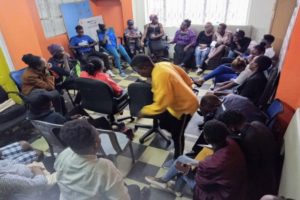By Wendy Otieno, Linking and Learning Amplifier- Kenya
We are all witness to the ravaging effects of the Covid-19 pandemic, not just on our health, but on our economies and societies. From the massive 2020 #BlackLivesMatter protests to Nigeria’s #EndSars movement, we are now also aware of some of the harshest existing forms of inequality that the pandemic could unmask, particularly affecting minority populations. For the development sector, social justice is at the apex of our interventions to promote real societal change. And this pandemic has hit our most fragile communities in unimaginable ways, doubling the burden of emergency response mechanisms on our local partners.
For funders, this new challenge pushed us to pause and reflect on our grant-making techniques. Particularly, on the need to cushion and provide flexible funding mechanisms for our grantees. In addition, we had to face difficult truths by reflecting, removing bias and unlearning our previous traditional forms of engagement with partners. This included bolstering their resilience through sustainable capacity-strengthening approaches.
As the Voice program’s Linking and Learning Amplifier for Kenya, I am delighted to share some of our big wins from 2020-2021. The linking and learning approach allows rightsholders themselves to come up with solutions to some of the most pressing social justice issues. Simply put, this is a non-monetary type of support that goes beyond grant making to enable collaboration, innovation, learning and … unlearning.
Re-thinking grant making by featuring linking and learning
First, Voice expanded the linking and learning approach from its first phase, where linking and learning grantees were encouraged to include learning questions in their proposals. This was scaled up to all grantees and now figures prominently in three different types of grants: innovate and learn, influencing, and empowerment accelerator.
Secondly, our context analysis has been a great addition to the linking and learning process that shapes proposals when it comes to requesting funding for local organizations, thus making local ownership a reality. Local organizations such as LEHA, Sullivan Reed and Endorois Women Council have embedded this in their strategies to spark transformative change at the grassroots level. In the second phase of the program, we aim to expand this by exploring partnerships with other donors so more rightsholders can take charge of advocating for their rights.
Thirdly, trust and empathy in grant-making emerged as a critical element in our partnerships with grantees. This was rolled out from the onset of the pandemic by maximizing transparency and honesty to strengthen our relationships with grantees.
Practicing self-care and wellness has been my fourth major lesson learned. This is not just for grantees, but also for colleagues to boost motivation and enthusiasm in adopting new agendas like diversity and inclusion.
Advocacy, community building and online knowledge exchange
Lastly, we enhanced learning by using online platforms for sharing knowledge among grantees. We built on this with a series of in-country and regional webinars. During a webinar titled Advocacy, our Tanzanian grantee Hapo Zamani Za Kale shared an article on “artivism” and the importance of leveraging digital spaces to positively influence public opinion.
Kenyan grantees, such as Sullivan Reed, equally embraced technology as a means of continuing to build their communities of practice as well as continue project implementation.
Voice also created an online platform in Kenya and Tanzania with the previous linking and learning facilitators that serves as a safe space for sharing and learning. This ensures that even more rightsholders have the space to become unapologetically bold and take ownership of their empowerment.
My main take-away from the linking and learning approach is that, as partners, stakeholders and like-minded allies exchange lessons, they become a unified and passionate force in advocating for their rights. Linking and learning enables established communities of practice to seamlessly carry on working beyond the Voice program.
As we continue to strive for change, we hope that more organizations – especially funding institutions – will embrace learning. Learning is essential to running the various functions within our institutions effectively, but also holds up a mirror to our biases so we can create more tangible, inclusive interventions.


